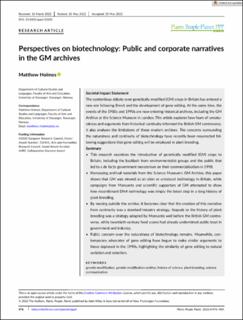| dc.contributor.author | Holmes, Matthew Robert | |
| dc.date.accessioned | 2023-03-22T10:01:01Z | |
| dc.date.available | 2023-03-22T10:01:01Z | |
| dc.date.created | 2022-09-12T11:49:26Z | |
| dc.date.issued | 2022 | |
| dc.identifier.citation | Holmes, M. (2022). Perspectives on biotechnology: Public and corporate narratives in the GM archives. Plants, People, Planet, 4(5), 476-484. | en_US |
| dc.identifier.issn | 2572-2611 | |
| dc.identifier.uri | https://hdl.handle.net/11250/3059768 | |
| dc.description.abstract | Societal Impact Statement
The contentious debate over genetically modified (GM) crops in Britain has entered a new era following Brexit and the development of gene editing. At the same time, the events of the 1980s and 1990s are now entering historical archives, including the GM Archive at the Science Museum in London. This article explores how fears of unnaturalness and arguments from historical continuity informed the British GM controversy. It also analyses the limitations of these modern archives. The concerns surrounding the naturalness and continuity of biotechnology have recently been resurrected following suggestions that gene editing will be employed in plant breeding.
Summary
This research examines the introduction of genetically modified (GM) crops to Britain, including the backlash from environmentalist groups and the public that led to a de facto government moratorium on their commercialisation in 1998.
Harnessing archival materials from the Science Museum's GM Archive, this paper shows that GM was viewed as an alien or unnatural technology in Britain, while campaigns from Monsanto and scientific supporters of GM attempted to show how recombinant DNA technology was simply the latest step in a long history of plant breeding.
By moving outside the archive, it becomes clear that the creation of this narrative from continuity was a standard industry strategy. Appeals to the history of plant breeding was a strategy adopted by Monsanto well before the British GM controversy, while twentieth-century food scares had already undermined public trust in government and industry.
Public concern over the naturalness of biotechnology remains. Meanwhile, contemporary advocates of gene editing have begun to make similar arguments to those deployed in the 1990s, highlighting the similarity of gene editing to natural variation and selection. | en_US |
| dc.language.iso | eng | en_US |
| dc.publisher | Wiley | en_US |
| dc.rights | Navngivelse 4.0 Internasjonal | * |
| dc.rights.uri | http://creativecommons.org/licenses/by/4.0/deed.no | * |
| dc.title | Perspectives on biotechnology: Public and corporate narratives in the GM archives | en_US |
| dc.type | Peer reviewed | en_US |
| dc.type | Journal article | en_US |
| dc.description.version | publishedVersion | en_US |
| dc.rights.holder | The authors | en_US |
| dc.subject.nsi | VDP::Samfunnsvitenskap: 200 | en_US |
| dc.subject.nsi | VDP::Landbruks- og Fiskerifag: 900 | en_US |
| dc.source.pagenumber | 476-484 | en_US |
| dc.source.volume | 4 | en_US |
| dc.source.journal | Plants, People, Planet | en_US |
| dc.source.issue | 5 | en_US |
| dc.identifier.doi | 10.1002/ppp3.10283 | |
| dc.identifier.cristin | 2050739 | |
| cristin.ispublished | true | |
| cristin.fulltext | original | |
| cristin.qualitycode | 1 | |

